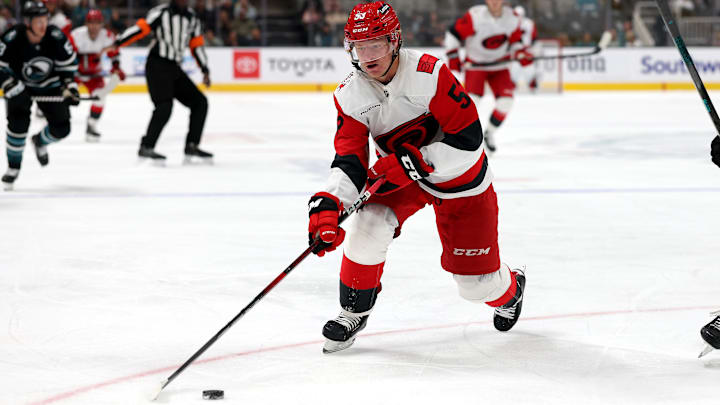In the last installment of the series, Frank Nazar’s exuberant contract was examined to demonstrate how developing teams, in small and big markets, will pay their players expensive contracts to entice them to stay on a team that is struggling to navigate the treacherous waters of rebuilding. But Carolina’s Jackson Blake answers the bell in which his recent contract will be analyzed and judged on how it will affect the contending Hurricanes for the future.
Carolina's not-so-storied playoff history
The Carolina Hurricanes have made some fascinating moves this offseason in their attempt to rebound from last year’s devastating defeat in the Eastern Conference Finals by the Stanley Cup Champions, the Florida Panthers. Carolina may have staved off the allegations of being unable to attract and sign star players when they signed Nikolaj Ehlers to an 8-year deal.
However, Jackson Blake’s signing may have been a step back and could serve as a reminder that even dominant teams like the Carolina Hurricanes are still cursed due to their low marketability. As a result, they resort to entrapping their promising young players with expensive contracts to prevent them from seeking employment in higher and more prosperous markets.
With Blake's slow start to the season, 2 goals and 4 assists for 6 points in 8 games, its time to ask the important questions of if the youngster is prepared to live up to the expectations that come with such a high price-tag.
Who is Jackson Blake?
Now this article isn’t meant to bash the Carolina Hurricanes; the franchise has been successful as of late in being a consistent playoff team and has performed quite dominantly in the regular season. But their inability to take that next step, especially being plagued by incompetence in the third round, has exposed their various needs, such as their quest for a second-line center after the failed Jesperi Kotkaniemi experiment and their need for stable goaltending.
Blake is a potent right-wing forward that ranges from the middle-six to the bottom-six depending on head coach Rod Brind’Amour’s system. In his first full year in the league, Blake posted 17 goals and 17 assists for 34 points in 80 games. Blake spent his first season in the middle six where he bounced around the lineup and has now assumed a position on Carolina' second line alongside Logan Stankoven and Taylor Hall.
The Hurricanes aren't exactly a top-heavy team, even during Mikko Rantanen's brief tenure with the team where he only potted 2 goals and 4 assists for 6 points in 13 games. Carolina amasses its strength through its potent bottom six as well as its crushing defense that imposes its will on an opposing team through structure. But its greatest weakness, its Moby Dick to its Captain Ahab, is filling in those two puzzle pieces that prevent them from taking that next step towards competing. So is Jackson Blake, a right-wing forward that has barely had time to develop in the NHL, really the answer to a second-line center or a consistent goaltending tandem?
For now, Jackson Blake likely serves as a placeholder and a band aid over a gaping wound awaiting for management to address, a marginal plank of plywood over a massive pothole hindering Carolina from properly competing. While it can be rebutted that the salary cap is continuing to increase and that locking up players that have the potential to explode in production is a good thing, similar to Blackhawks fans, the Hurricanes will have a question potentially haunting them for the next few years: What if Blake stagnates or regresses? While General Manager Eric Tulsky received praise across the league for seemingly locking up a budding young star in Jackson Blake to a lucrative but long-term deal, it seems that he hasn’t learned from his predecessor Don Waddell and his haunting failure of the Jesperi Kotkaniemi contract.
Lessons from a haunting past
Kotkaniemi, who was a former third-overall pick and was slated to be the second-line center of the future of the Canes, was locked up to a long-term deal by the Hurricanes and has become a cautionary tale for dishing out lucrative deals to promising players before actually determining if they can thrive in a franchise’s system. It should be noted that Kotkaniemi played three seasons in the NHL before being offer sheeted by the Hurricanes, while Blake has only played one full season.
As haunting as the Kotkaniemi contract is for Hurricanes’ fans, and maybe they’ll compensate that Blake can be different, it should be of comfort that Blake will have almost a decade to prove his worth. Eric Tulsky attempts to display to the league and his fellow general managers that he is playing chess, not checkers. However, if Blake fails to consistently produce, and even improve, Tulsky will instead have an overpriced bottom sixer at best or an AHLer at worst cracking his middle six.
